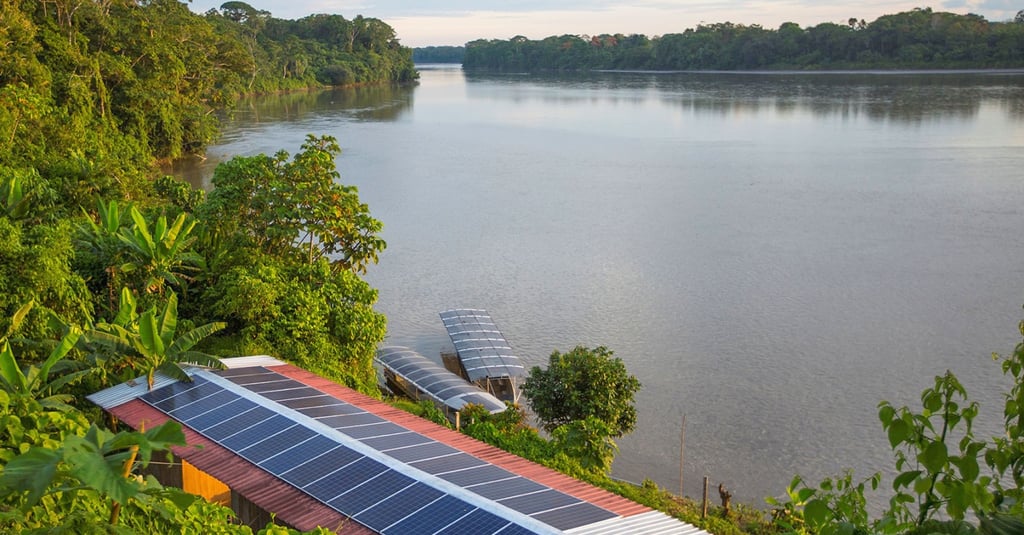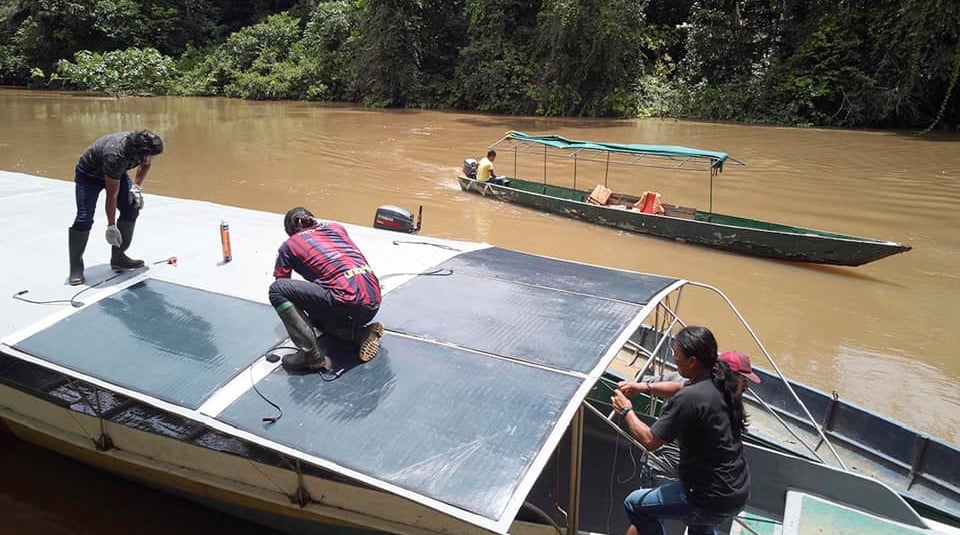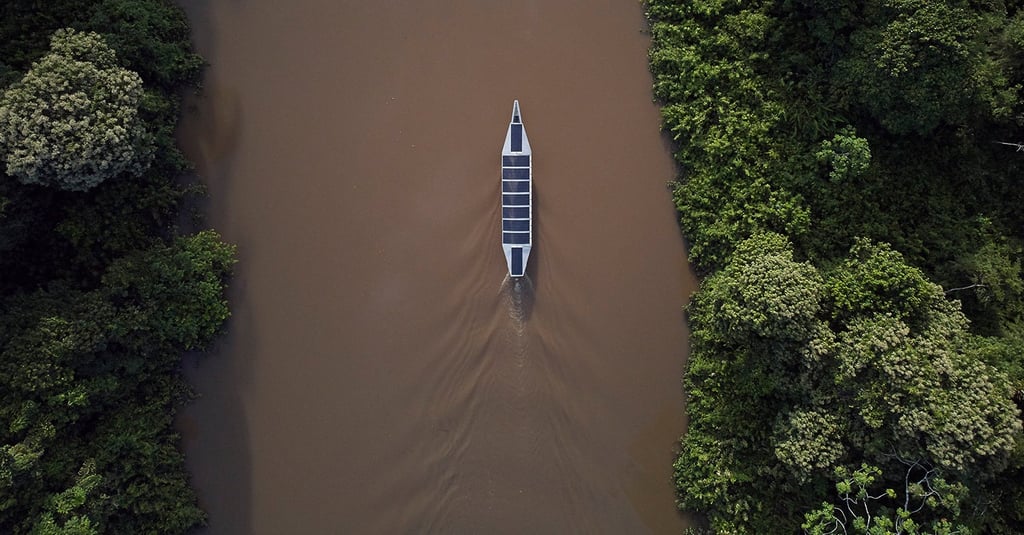Technological Advances in Solar Energy
In the remote stretches of Ecuador's Amazon rainforest, an inspiring tale of sustainability and tradition unfolds as indigenous Achuar communities turn to solar-powered boats for transportation. These innovative vessels, topped with solar panels, glide silently through the river systems, offering a sustainable alternative to conventional fuel-powered boats. This initiative not only protects the lush biodiversity of the Amazon but also aligns with the Achuar’s commitment to ecological stewardship and cultural preservation. The move towards solar energy represents a critical step in blending traditional knowledge with modern technology to combat environmental challenges.
4 min read


Embracing Renewable Energy in the Heart of the Amazon
Deep in the vast, verdant expanse of Ecuador's Amazon rainforest, the indigenous Achuar communities are pioneering a remarkable environmental initiative. In a region where the river is the main artery of transport and life, these communities have introduced a fleet of solar-powered boats, a testament to their commitment to sustainability and ecological preservation.
The initiative began as a collaborative effort to address the dual challenges of environmental degradation and the need for reliable transportation in the Amazon's challenging terrain. Traditional gasoline-powered boats, while effective, posed significant risks to the river's ecosystem, contributing to pollution and disturbing the aquatic life that the Achuar and countless other species rely on for survival.
Recognizing the potential of solar power, the Achuar partnered with local environmental groups and technology experts to develop boats that could harness the abundant sunlight of the region. These boats are equipped with sleek, efficient solar panels that power silent electric motors, providing a clean alternative to the noisy and polluting engines commonly used in the area.
This transition to solar-powered transportation is not just about preserving the natural beauty and biodiversity of the Amazon. It also represents a profound respect for the Achuar's ancestral lands and traditions, which have always emphasized harmony with nature. By integrating modern renewable energy technologies with traditional ways of living, the Achuar are setting a precedent for conservation efforts worldwide, demonstrating that sustainability can be achieved without sacrificing the cultural and practical necessities of indigenous life.
The move towards solar energy in the Amazon is a beacon of hope and innovation, showcasing the possibilities of renewable energy in remote and challenging environments. It stands as a powerful example of how traditional knowledge and modern technology can come together to create solutions that benefit both people and the planet.
Navigating Challenges and Expanding Impact
As the Achuar communities in Ecuador advance their use of solar-powered boats, they navigate both the promising potential and practical challenges of their innovative endeavor. These boats represent a significant leap forward in eco-friendly transportation, but the journey to integrate them into daily life is complex, involving technical, cultural, and logistical hurdles.
One of the primary challenges is the maintenance and sustainability of solar technology in the humid, often unpredictable Amazonian climate. The technology must be robust enough to handle the heavy rainfall and intense sun exposure, requiring ongoing maintenance and local expertise. To address this, the communities have initiated training programs that empower local technicians to manage and repair the solar panels and batteries, ensuring that the boats remain operable without external assistance.
Moreover, the project is not just about transportation but also about conservation. The use of solar-powered boats significantly reduces the oil runoff and noise pollution that traditional boats produce, which have long disrupted aquatic life and the natural balance of the river ecosystems. This shift has had a noticeable positive impact on the local wildlife, with reports of clearer waters and a return of some species that had been driven away by motor noise and pollution.
The broader impact of these solar boats stretches beyond environmental benefits; they also enhance connectivity between remote communities. Reliable and sustainable river transport is crucial for the Achuar, as it facilitates access to essential services, educational opportunities, and inter-community trade. This connectivity fosters stronger social bonds and economic development within and between communities, reinforcing the Achuar's resilience and autonomy.
By overcoming these challenges, the Achuar are not only protecting their ancestral environment but are also creating a model of sustainable development that other indigenous and rural communities around the globe might follow. The success of these solar-powered boats could inspire similar projects worldwide, showcasing the practical viability and ecological benefits of integrating renewable energy solutions in remote settings.
Envisioning a Sustainable Future
The introduction of solar-powered boats by the Achuar communities in Ecuador's Amazon not only marks a shift towards sustainable practices but also ignites a beacon of hope for environmental conservation and cultural preservation. As these communities demonstrate the practical benefits of renewable energy, they also lay the groundwork for a broader dialogue on sustainable development in sensitive ecological zones around the world.
Looking ahead, the Achuar aim to expand this project to encompass more communities and possibly adapt the technology for other uses that respect the environmental integrity of the Amazon. This vision includes potentially exporting their knowledge and models to other indigenous communities globally, fostering a network of environmental stewardship based on shared experiences and technologies.
The success of the Achuar's solar boats has sparked interest from environmental groups and governments, attracting partnerships and funding that could further enhance the project's reach and sophistication. These collaborations could lead to innovations tailored to different environments, multiplying the impact of the Achuar’s initial venture.
Ultimately, the story of the Achuar and their solar boats is a powerful reminder of the potential for indigenous knowledge to intersect with modern technology in addressing global environmental challenges. It underscores the importance of listening to and incorporating the insights of indigenous peoples, whose lives are intricately woven into the ecosystems they inhabit.
As the world grapples with climate change and seeks sustainable solutions, the example set by the Achuar offers valuable lessons in resilience, innovation, and the importance of preserving our planet for future generations. The continuation of such projects could significantly influence global approaches to environmental challenges, promoting a future where technology and tradition coexist in harmony for the health of our planet.




Contact
Subscribe to our newsletter
© 2002 - 2026. All rights reserved.
